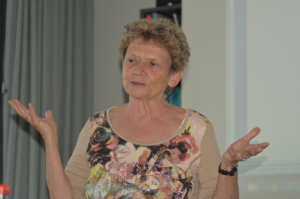Carmen Stadelhofer
For the preservation of a peaceful and united Europe the social inclusion of citizens of all European countries is highly needed. Particularly older people must be given the opportunity to participate actively in social developments and to become themselves the actors of social change. In time, when Europe is put into question by many people, especially older people, citizens are asked to fight against discrimination, social exclusion, to take actively part in constructing the future of Europe based on democratic values and solidarity. Good practice projects and methods are needed to foster social inclusion of all ages, to reduce stereotypes and prejudices about the others in own countries and about people living in the other countries and to strengthen European awareness and European identity.
As a convinced European, I ‘m engaged since 1995 developing new activating methods in adult education to foster seniors’ education, social participation and intergenerational and intercultural dialogue. 1995 I created the first Internet-based seniors educational international Network “Learning in Later Life (LiLL), with a lot of good European partners we realized many projects on European level. 2008 I realized that we are in cooperation with 21 different European countries but that the countries from Southeastern Europe are missing and that – until now – people of these countries had only a limited chance of taking part in general education. The process of democratization in the Middle and Southern Europe after 1989 has led to new opportunities for social participation on national and transnational levels, but mainly for older adults, women and people with low education there is a lack of good practice models fostering active social participation and European consciousness. Ulm is on the Danube and by this actively related with the other Danube countries. So I initiated as director of ZAWiW at Ulm University in 2008 the cooperation with other educational organizations in the Danube region and we created the educational Network Danube-Networkers and 2014 the international Association “Danube-Networkers for Europe (DANET). Central aim is to develop and apply in the sense of action research by non-formal and in-formal learning settings methods to overcome barriers– language and cultural and social barriers between people of different political and cultural origins in the Danube Region and fostering European awareness and European identity to other educational providers and by this to citizens of all ages, ethnics and social conditions, especially for all elderly.
By doing this I learned and always learn a lot about the history and reality of South-East Europe, I met many engaged and nice persons, get to know about wonderful traditions — I’m about to become a real European!
Good practice experiences and European encounters will encourage these population groups to reflect critically the national developments and the Europeans policies, to express their concerns and to define their own opportunities for action in the frame of a United Europe.

